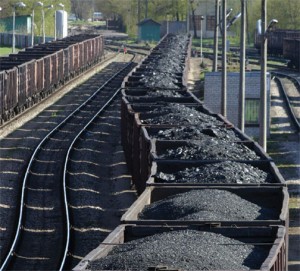
Several reports released in late November paint a startling picture of environmental hazards gone unregulated and a public largely uninformed by them. One of them focuses on the health hazards associated with coal trains and the other on the lack of regulation for radioactive drilling waste disposal. Both of them paint a picture of government agencies and states arguably not doing enough to protect and inform the public.
Coal Trains
According to new research released by the University of Washington, open coal trains emit very harmful particulate matter—more so than other diesel trains. Specifically, researchers found twice as much “PM [particulate matter] 2.5,” which can get lodged into the lungs and cause serious respiratory and cardiovascular issues–sometimes even death. Although train companies have historically claimed that spraying surfactant onto the trains prevents the coal dust from spreading, the dust very clearly creates dust plumes and the coal itself often falls out of the trains and onto the land, beside the train tracks.
Radioactive Drilling Waste Disposal
A separate, but also new report released in late November revealed that human health and natural resources are in danger from the process of extracting oil and natural gas because of the briny waste water and radioactive sludge that it produces. Up to 70 tons a day of radioactive waste is produced in states like North Dakota, but because it is too dangerous to place in landfills, it is often dumped illegally, creating serious environmental and health hazards not only for those nearby, but for those downstream and out of state. Unfortunately, there is no federal agency overseeing this issue—it is instead left to the states—many of which do not regulate it at all. The new report effectively calls on the federal government to start regulating the waste before it is too late, as well as some rigorous, comprehensive state standards.
As we previously described, this kind of waste is typically produced as a result of hydraulic fracturing, aka “fracking.” Once that water is injected below ground and returns to the surface with radioactive materials in the process, everything that touches it becomes radioactive. In particular, the radium can in fact contaminate drinking water and build up, finding its way into crops and natural resources like plants. This particular substance can cause cancer, while the water itself is sent to sewage plants and passed onto rivers, threatening nearby communities.
Challenges Close To Home
Sadly, the development of rules and regulations often moves very slowly, even though these issues are creating environmental and human health hazards every moment of every day. It is often easier and cheaper to pollute the local environment than properly dispose of waste or control for it preventatively, particularly if there are issues with enforcement. When people are harmed due to this pollution and federal and state agencies do not take action to intervene, sometimes litigation is the only option.
Contact Our New Orleans Environmental Hazard Attorneys
This has led quite a few citizens to bring claims to challenge the introduction of these hazards into their communities using a variety of environmental laws include nuisance, trespass, toxic torts, and other legal theories, including here in Louisiana. If you or your community has been the victim of an environmental hazard such as coal trains or radioactive drilling, contact the attorneys at Harrell & Nowak today for a free consultation so that we can help.
